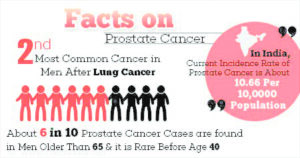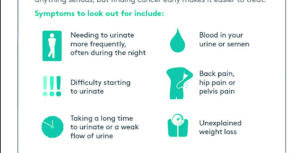

Prostate Cancer is a cancer which originates in the Prostate Gland. It is a small walnut-shaped gland in males that produces the seminal fluid that nourishes and transports sperm. Generally considered to be common in older male population but there’s been an increase in early onset prostate cancer in younger males around the world.
Prostate Cancer can be aggressive sometimes or can remain confined to the Prostate Gland but when detected early, it has the best chance of treatment success.

What are the causes and risk factors of Prostate Cancer?
The cells in the prostate gland sometimes develop changes in their DNA. The changes tell the cells to grow and divide more rapidly and in unregulated manner than normal cells do. A family history of prostate cancer may increase the risk for early onset Prostate Cancer. Obesity has also been linked to developing a higher risk of aggressive prostate cancer. Smoking and a diet high in red meat or high-fat dairy products and low in fruits and vegetables may increase the risk of developing prostate cancer.
Symptoms of Prostate Cancer
When the cancer reaches an advance stage, it may exhibit symptoms such as:
•Trouble urinating
•Decreased force in the stream of urine
•Hematuria – Blood in the urine
•Hematospermia- Blood in the semen
•Unexplained weight loss
•Erectile dysfunction
Investigation carried out to diagnose Prostate Cancer –
The doctor would prescribe some tests to diagnose the disease and move ahead with the treatment.
•Digital Rectal Exam (DRE): A doctor inserts a gloved, lubricated finger into the rectum to examine the prostate for any abnormalities.
•Prostate-Specific Antigen (PSA) test: A blood test that measures the level of PSA,a protein produced by the prostate gland. Elevated PSA levels may indicate thepresence of prostate cancer.
•Biopsy: A procedure in which a small sample of prostate tissue is removed andexamined under a microscope to check for the presence of cancer cells.
Treatment for Prostate Cancer-
•Chemotherapy – Conservative treatment using high dosage medications are used to reduce the size of the tumour.
•Radiotherapy – Using high energy waves to reduce or kill the tumour.
•Radical Prostatectomy – Removal of the prostate, including the prostate gland and surrounding tissues. The surgery may be open or laparoscopic.
•Immunotherapy – Medications are used to activate the body’s immune system to recognise and kill cancer cells.
•Hormone Therapy -Testosterone helps the prostate cancer cells grow. Hormone therapy stops the body from making testosterone or stops it from getting to cancer cells.
Prevention of Prostate Cancer
A healthy, nutritious and balanced diet is crucial to avoid maximum number of diseases. Choose a healthy diet with a variety of fruits and vegetables and whole grains. Food sources of vitamins and nutrients are considered the best.
The best way would be to exercise and maintain a healthy weight. Start slow and increase the frequency of exercises. One must exercise at least 2-3 times a week.
Seek support from family, friends, or support groups. It always helps to know you are not alone. Consult a healthcare professional if you have a very high risk of prostate cancer, you and your doctor may consider medications or other treatments to reduce the risk.
In conclusion, an early detection and timely treatment can significantly improve the chances of successful management and recovery from prostate cancer. It’s crucial to consult a healthcare professional for personalised advice and guidance.
The author is the Director and Head of Department in Urology, Uro-Oncology, Andrology, Uro-Robotics at Sanar International Hospitals.















